QuestionQUESTION: Hi! I've had my male leopard gecko for about 3-4 years now. He had always been healthy until recently when I noticed his joints swelling up,the 'reptile vet' I took him to didn't know that much about leopard geckos and just suggested I put him down because he had gout. however, I work at a vet clinic and I found that giving him an anti-inflammatory and allopurinol were the only treatments to help with gout. His tail has gained a lot more weight recently (it was very thin) since I have been handing feeding him baby food. His joint swelling has significantly improved however, yesterday he had blood in his stool (was firm), so I took him off of the anti-inflammatory. Last night his stool was liquidy but had no blood and now both of his eyes have goopy stuff in them.
I assume he has gotten a respiratory infection from some of the medicine not going in his mouth but up his nose from the very first dose I gave him last week.. Another symptom I have noticed is his belly (upper to mid left side) is a lot darker. He is on carpet and doesn't have anything that could cause impaction as far as I know. Should I just give him an antibiotic and see how he does? He has been getting pedilyte and warm water baths for a week or so now as well.
ANSWER: Hi, Christy,
Has he been tested for internal parasites? What types of supplements do you use? Leopard gecko lifespan is normally 15 or more years, so he is still quite a young guy.
Goopy eyes may be an eye infection, or a deficiency--check inside the mouth for mucous or reddening that might indicate a respiratory infection. A culture should be taken to identify the organism causing the problem, so the right antibiotic can be used.
Swollen joints may be associated with secondary nutritional hyperparathyroidism, and swollen eyes may be associated with a vitamin A deficiency. These are the most common causes of these symptoms in leopard geckos.
All insects should be dusted with a quality calcium powder containing vitamin D3, and once a week, use a vitamin supplement powder for reptiles that contains pre-formed vitamin A. If you're feeding by hand right now, mix safe amounts of these supplements into the food you are giving him.
It would be best to consult an experienced reptile veterinarian. ARAV.org may be helpful in locating one near you.
First things to check with any reptile health issue are husbandry, and diet. Leopard geckos should have 80F daytime air temperatures, with a 90F basking spot, a humid hide, and water available. Food should be gut-loaded crickets and mealworms, or feeder roaches, as a staple, and should be supplemented.
The most common ailments are internal parasites contracted from live feeders, respiratory infections, mouth infections, and skin infections. It's difficult to imagine how a leopard gecko would get gout, especially one that is so young, unless it was chronically dehydrated--with a humid hide and water available, this is most unlikely for a desert dwelling animal.
You definitely need a second veterinary opinion.
---------- FOLLOW-UP ----------
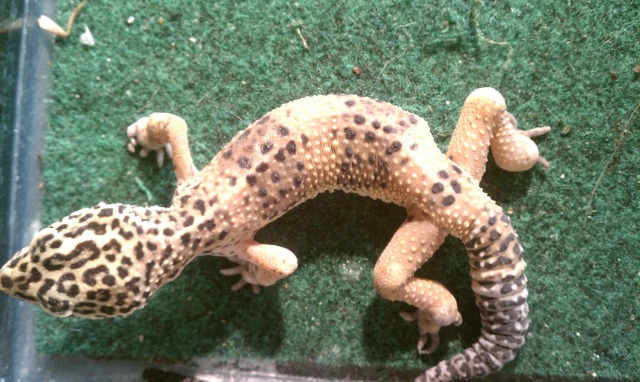 Smaug body
Smaug body 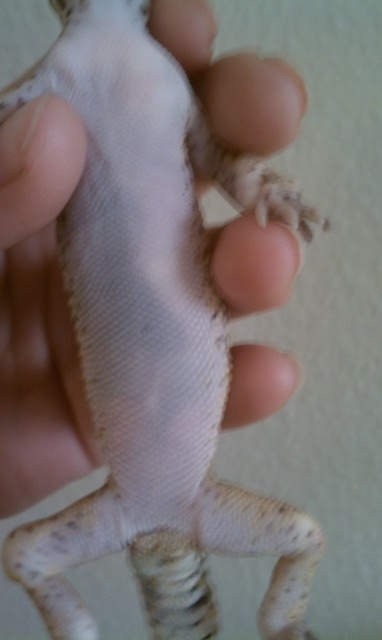 Smaug belly
Smaug belly
QUESTION: Well the first vet I took her to aspirated one of the worst swollen joints and I saw her take like 10 books with her but she said that there were crystals in the white stuff she pulled out of the swollen bubble. She also told me to put him down that day though without any suggestion of what medicines to give him.
I did contact a reptile vet (the closest one is 4 hours away) and he suggested giving him a .1 injection of Baytril and feeding him baby chicken food. My gecko had not been shedding right recently and I have had to help him every time he's shed in the last 2 months, the first time I noticed he needed help I noticed it a little late and that's why I thought his joints were swollen but it has been so long since then I feel like if it were due to the constricting shed skin, the swelling should have gotten better by now, so the reptile vet suggested giving baytril because he said it sounded like an infection from the shed skin squeezing him.
He has not been tested for parasites and I am taking a piece of the bloody stool with me to work today and I am going to check his fecal to see if I can find anything. He is on reptile carpet, has 3 hides, one on the cool side (83ish degrees) one in the middle, and one on the warm side (96 ish degrees). He has always eaten crickets until recently when he stopped eating (crickets were dusted with calcium WITH d3 and he had a dish that has calcium available to him 24/7). I keep the moss in his hide damp with water and he gets fresh clean water every day.
When he wasn't eating crickets, I offered him mealworms, which he loved for a while, and now won't eat them. Once he stopped eating, I fed him wax worms since he needed to eat something to put some meat back on his bones. All the crickets I get are gut loaded, not sure about the mealworms.
He hasn't vomited, but now both eyes are closed and he wiggles his tail low and fast almost like twitching a lot. His eyes aren't swollen, they just have stuff in them. His feces is no longer runny today but there is def blood in it. I have never used a supplement with vitamin A, so I will go buy some today and use it with the baby food.
His mouth looks good, no blood, no reddening or mucus. Another reason why I thought it was a resp. infection is that he had bubbles coming from his nose the whole afternoon after the initial medicine dosing. I am leaving some pictures as his belly just doesn't look right to me. Thank you very much!!!!
AnswerAs a non-veterinarian, the only advice I could (or should) give is that he does appear to be in very poor shape, and his joints are incredibly swollen. It's not really typical for hyperparathyroidism, as that usually causes edema. If you want to go the full route with him, I would have your next vet do bloodwork and check his kidney function. This could all be the result of kidney damage.
Is the blood in the stool, or in the urates? That may offer a clue as well.
I'll be honest that a good outcome doesn't look very likely.
http://www.merckmanuals.com/pethealth/exotic_pets/reptiles/disorders_and_disease



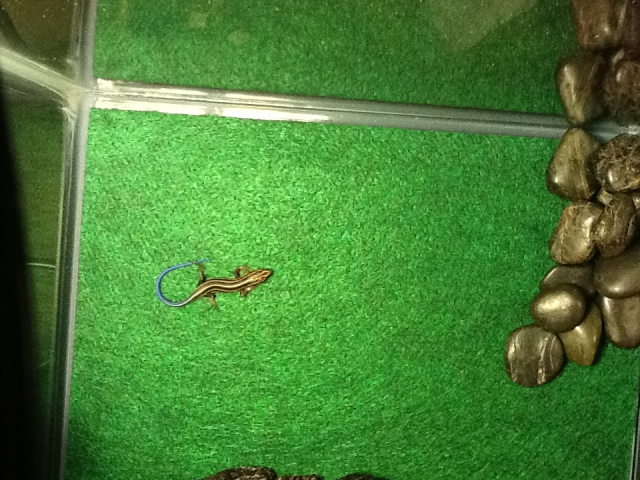 Five lined skink
QuestionQUESTION: Hi, I live in myrtle beach sc a
Five lined skink
QuestionQUESTION: Hi, I live in myrtle beach sc a
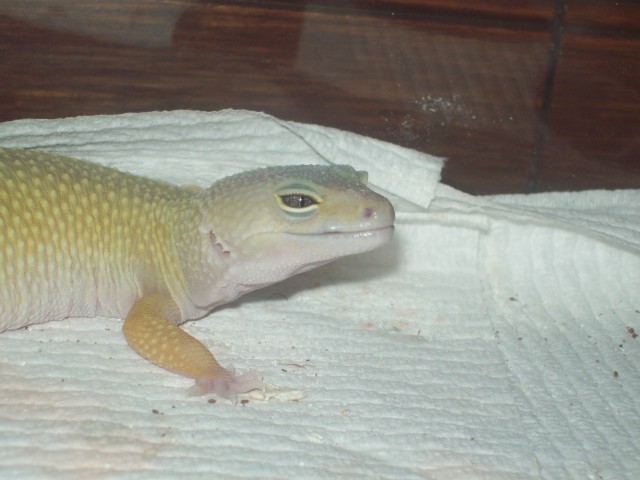 Whats wrong with me Gecko, not eating, lump?!?! HELP!
QuestionQUESTION: Okay, So I think my leopard gecko may
Whats wrong with me Gecko, not eating, lump?!?! HELP!
QuestionQUESTION: Okay, So I think my leopard gecko may
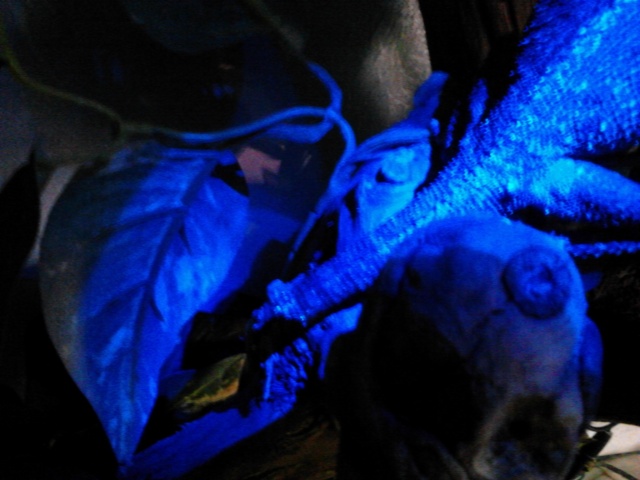 Broken Tail
Question
Broken Tail!
I have a female Mountain H
Broken Tail
Question
Broken Tail!
I have a female Mountain H
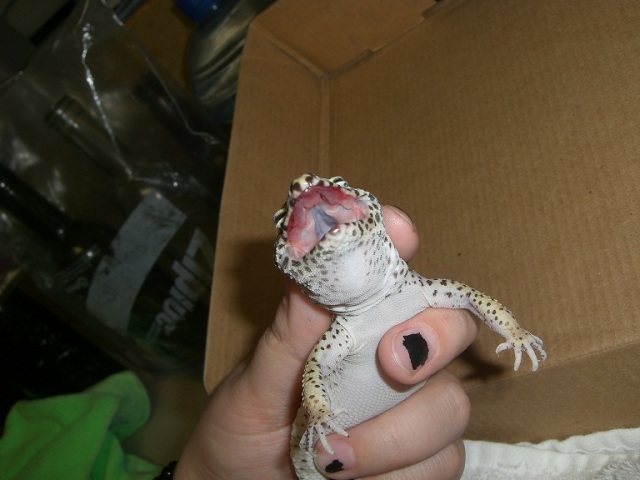 Mouth Rot
Question
Scratchs mouth
Hi there, I sent a question you
Mouth Rot
Question
Scratchs mouth
Hi there, I sent a question you
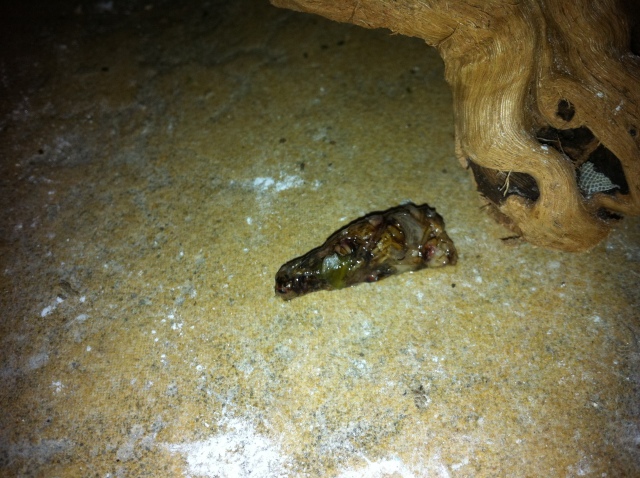 Beardies poop
Question
Fecal
Hi Diane,She just had another bowl movem
Beardies poop
Question
Fecal
Hi Diane,She just had another bowl movem